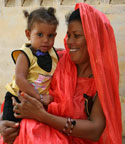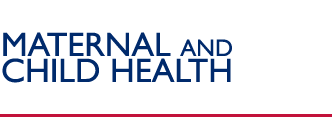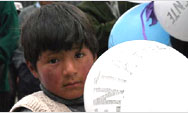Maternal Health
Saving the Lives of Women and Children
| |
Learn From My Story: Women Confront Fistula in Rural Uganda
The ACQUIRE Project, a USAID-supported initiative managed by EngenderHealth, released a collection of videos of Ugandan fistula survivors. Produced in partnership with the Center for Digital Storytelling and St. Joseph's Hospital in Kitovu, Uganda these moving stories were captured at a workshop for women with fistula, where they recounted the hardships they endured and as well as their search for safety, acceptance, and dignity.
View the films |
Each year more than 500,000 women, 99 percent of them in developing countries, die from pregnancy- and childbirth-related complications, and an additional 15 to 20 million women suffer debilitating consequences of pregnancy. USAID has sharpened its focus on a set of effective interventions targeting specific high-mortality complications of pregnancy and birth – hemorrhage, hypertension, infections, anemia, and prolonged labor. Annually, 4 million newborns die in the first four weeks of life, accounting for 40 percent of all deaths among children under the age of 5. USAID assists newborn care programs in 27 countries, covering the full spectrum of approaches, ranging from community-based activities to outreach and clinic care. Additionally, across all USAID-assisted countries, deliveries attended by skilled health workers have increased from an average of 37 percent in 1990 to 50 percent today.
Through its investments in maternal and neonatal health programs, USAID improves the health and quality of life of millions of women and children worldwide. The Agency’s approach to maternal and neonatal health follows a continuum of care from pre-pregnancy through the postpartum period. For example, both mother and baby benefit from interventions that address infections and nutritional deficiencies during pregnancy, hygienic practices during delivery, and birth spacing and counseling during postpartum care. USAID programs foster community involvement, promote evidence-based interventions (interventions that, after rigorous testing, have documented proof of their effectiveness), improve access to and quality of health services, and equip birth attendants with the knowledge, skills, drugs, and supplies to deliver lifesaving care and reduce preventable maternal and neonatal mortality. USAID-supported programs empower families and communities to prepare for childbirth by using skilled birth attendants; improving self-care and nutrition; recognizing complications; and finding means to overcome barriers to care.
Through its innovative programs, USAID remains at the forefront of global efforts to reduce maternal mortality and disability, with a number of USAID-assisted countries achieving significant results. Newborn survival and health are profoundly affected by maternal health and nutrition, and are a major focus of the Agency's maternal and newborn health strategy.
 |
| Source: USAID/Senegal |
Health Research Program (HaRP)
Through collaborating partners, USAID's Health Research Program (HaRP) identifies the challenges for maternal and child health in developing countries and countries in transition, and designs the most effective approach to overcome them. These challenges range from infectious diseases to malnutrition to health services delivery by community health workers.
Visit the HaRP Web site at http://www.harpnet.org
Technical Areas
Maternal and Newborn Care
Health System Strengthening
Additional Information
|


